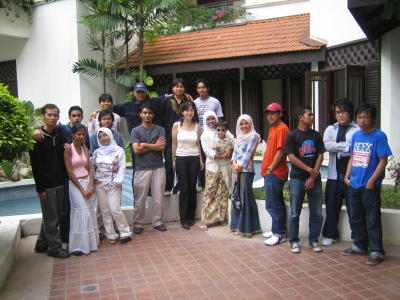I'm franky disturbed that my previous post of my class's reunion gathering sounds more like an organizational and leadership skills essay rather than a plain and simple jottings of the gathering itself. But then, I am not exactly famed for my ability to stick to the main points and not veer off from the relevant main topics in my writings; it is not something I'm proud of either.
 My classmates - one year after...
My classmates - one year after... Anyway, my class's reunion gathering went smoothly despite the minor complications during the planning staged. It was really heartwarming to be able to meet up with all of them again, to catch up on things, excitedly exchanging news, stories and gossips, openly sharing jokes and laughing at it together. Besides, the food was good too.
Some of us might shudder and cringe at the thought of attending a reunion and some cannot endure the line of questioning which one will have to face at such events. Granted, some of us will be subjected to such questions at a reunion, but what is more important is how one uses that information afterwards - will it be used to compare one's achievements so far with others? - and whether one is comfortable to dilvulge such information to others in the first place.
Personally, if the reunion begins to resemble an interrogation or a cross-examination, I think it would have second thoughts about attending it as well. But then again, such reluctance also speaks volumes about yourself.
I think you have to have a clear idea of what the reunion is all about: is it about catching up and meeting old friends or is it sort of a victory parade to show and celebrate one's achievements?
I believe that one does not have to attend a reunion to achieve the latter; true and genuine achievements and accomplishments do not need to be trumpeted by the individual itself because such things are 'light' enough to 'float' and reach a huge group of people but 'heavy' enough to leave a lasting impression on the person who hears about it.
Such attempts to shamelessly proclaim such things tells more about the nature of the person rather than their accomplishments. After all, desperate people resort to desperate measures.
And I think it's a really sad if we choose not to attend such reunions just because one person is desperate to show off how much he have accomplished since the last time you met him. It's really irresponsible of us to deny our friends the pleasure and joy of seeing us again just because a single person could not resist the temptations to publicly parade himself.
As for my gathering the other day, I'm glad to say that none of us have to endure such display of ego; I think the bond between us have grown so deep and so strong that all of us view such things as shamelessly superficial and we realized that there are other more fundamental and lasting things than that. Even if one of us were to tell us of his/her accomplishments, I think most of us will be overjoyed for him/her rather than feeling uncomfortable with him/her telling it to us.
It's a funny thing but when we met the other day, it felt as if we never even said goodbye and it's hard to believe that almost a year have passed since we last see each other together. The atmosphere during the gathering was one of geniune happiness and warmth and it almost felt like the old times we had back in college.
Of course, most of us have changed - our priorities are different, our outlook on life have been elevated to a higher level, our behavior have been altered - but it seemed that there is one small part of us that still remains the same, the feeling of camaraderie between us and it was obvious that that feeling was reignited during the gathering.
And you know what? I found out that the 1st of August was Friendship Day and our gathering was held on the 31st July; how fitting indeed...


